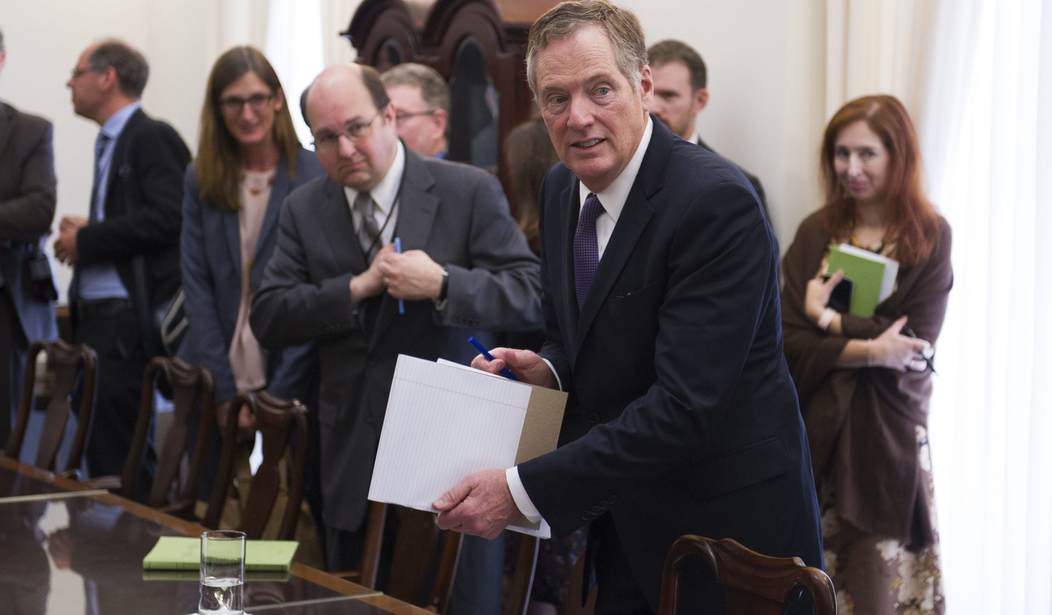WASHINGTON – U.S. Trade Representative Robert Lighthizer on Monday released the administration’s negotiating objectives for the North American Free Trade Agreement, which prioritizes balancing a trade deficit with Mexico that has grown from $1.3 billion to $64 billion since NAFTA took effect in 1994.
President Trump has repeatedly blasted NAFTA as the “worst trade agreement” in history, and during his presidential campaign threatened to eliminate American participation. Critics have questioned the administration’s focus on the budget deficit with Mexico, asking whether it’s a fair barometer for the effectiveness of the deal.
Lighthizer in an announcement on Monday said that the administration will look to balance the bilateral goods trade balance with Mexico, as well as explore market access issues with Canada tied to dairy, wine, grain and other products.
“President Trump continues to fulfill his promise to renegotiate NAFTA to get a much better deal for all Americans,” Lighthizer said in a statement. “Too many Americans have been hurt by closed factories, exported jobs, and broken political promises. Under President Trump’s leadership, USTR will negotiate a fair deal.We will seek to address America’s persistent trade imbalances, break down trade barriers, and give Americans new opportunities to grow their exports. President Trump is reclaiming American prosperity and making our country great again.”
Darci Vetter, former chief agricultural negotiator for the Office of the U.S. Trade Representative under the Obama administration, in an interview on Tuesday questioned the administration’s “reductionist” view and its potential impact on positive aspects of the deal. She asked how the administration plans to pursue a rebalancing with Mexico while also encouraging the free flow of goods and services with greater transparency, better opportunity for small businesses to participate in NAFTA and without tariff protections.
“It’s really unclear how you pursue those trade strategies if you think of the trade relationship as an addition-and-subtraction exercise. If it’s net-net, then we win. If it’s not, then we lose,” she said, arguing that the relationships with Canada and Mexico are more nuanced than that. “I’m not sure that that math – did we buy more from them, or did they buy more from us – is a very good representation of the value of NAFTA.”
Others have argued that a two-way view of addition and subtraction, without taking into account the multiplier impacts, is not a fair assessment. For instance, a company buying cheaper component parts to assemble final products to be sold in the U.S. or outside of North America would result in a negative balance, even though there might be a net gain in finished products sold.
According to Lighthizer, this is the first time his office has included deficit reduction as a specific goal for NAFTA. Since the ambassador notified Congress in May of the administration’s intention to re-negotiate NAFTA, the office has fielded more than 12,000 public comments and heard testimony from more than 140 witnesses over three days of hearings earlier this summer.
In addition to budget deficit reduction, the administration’s objectives include adding a digital economy chapter to NAFTA and incorporating and strengthening labor and environment obligations currently included in supplemental agreements. The administration also has vowed to eliminate “unfair subsidies, market-distorting practices by state-owned enterprises, and burdensome restrictions on intellectual property.”
Sen. Jeff Flake (R-Ariz.), who launched a pro-NAFTA campaign in June, regarded the unveiling of the administration’s NAFTA objectives as the start of a long process that could have major impacts on his state’s economy. Mexico serves as the No. 1 export customer for Arizona, which produces large amounts of fruit, vegetables and cotton. Flake’s campaign involved gathering stories from Arizona businesses, farmers and residents who have been positively impacted by the 23-year-old trade agreement.
“I will review (the objectives) closely as I continue to talk with Arizonans about what they need to ensure vibrant cross-border trade and look forward to continued consultation with the administration as the process moves forward,” Flake said in a statement.









Join the conversation as a VIP Member